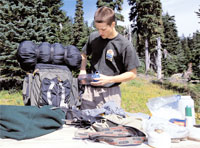Why is my pack so heavy?
 Q. I’ve been in Scouts for about a year and I was wondering why my backpack is so heavy. I only pack about two pairs of jeans, extra socks and two shirts. I also pack a mess kit and a flashlight plus batteries. My sleeping pad is not heavy; neither is my sleeping bag. Why might my pack be so heavy and do you know how to fix it?
Q. I’ve been in Scouts for about a year and I was wondering why my backpack is so heavy. I only pack about two pairs of jeans, extra socks and two shirts. I also pack a mess kit and a flashlight plus batteries. My sleeping pad is not heavy; neither is my sleeping bag. Why might my pack be so heavy and do you know how to fix it?
—Overweight Robert, Coventry, R.I.
A. The first thing you said that raises a red flag is that you always pack two pairs of jeans. Now, I love jeans as much as the next guy, but they probably aren’t the best choice for outings for a couple of reasons: 1) they do weigh a lot, about 1 to 1.5 pounds per pair; 2) when they get wet, they weigh tons more and give you zero insulation from the cold.
So, swap those jeans for a single pair of nylon zip-off pants. They are more versatile (can become shorts when you’re warm), quick-drying and weigh only about 10 or 12 ounces—half as much as a pair of jeans. If it’s cold, throw in a pair of long underwear to layer underneath. As for two shirts, that’s not excessive, but just make sure that the two shirts you bring can work together. So, for example, bring one long sleeve and one short sleeve. They should be made of a quick-dry polyester blend or even wool, both of which will keep you warm even when wet. When it gets cold, wear them layered together.
Finally, pack only what you really need. Click here to check out some of our easy-to- follow gear packing lists.

That is SO helpful!
My jeans are actually pretty heavy!
Thanks!!!
What about your food? I assume if you are backpacking you are carrying something to eat! You don’t want to starve, but take a look at what you are carrying to eat. Extra packaging material and too large portions add weight (and waste). General rule of thumb is 1.5 to 2 lbs of food per day. So for an overnighter you should only be carrying 2 lbs of food. Water also weighs a lot so evaluate that as well. (approx 8 lbs per gallon or 2 lbs per liter roughly.)
The heaviest things are your pack, sleeping bag, and tent. If yours are heavy, they are probably old and can be replaced by newer and lighter versions. You might be able to borrow a piece of equipment from a friend to check it out. Many backpackers take only one change of clothes. Wear one set of clothes and pack the other. Jeans are about the heaviest and worst thing to take. Skip anything cotton and buy clothes made of synthetic fabrics. they are lighter and dry faster.
one thing is probaly the metal frame inside your pack
I love back packing I’m doing a 50 Miller in spring break. Hay gear guy do you have any tips?
i love backpacking!!!!!!!!!!!! 🙂
It depends on how long you are going to be hiking. You may not need but one change of Jeans with two t-shirts. You can use natural elements instead of a pad to sleep on such as leaves and moss. Wear your knife in a sheath. Make sure that you have a good backpack with a frame if possible to support weight evenly.
The other thing to look at is the kind of flashlight you pack. If it takes anything bigger than AA batteries, consider getting a newer, lighter one. They make some really bright LED flashlights that weigh next to nothing, and run for what seems like forever on one or two AA batteries.
Also, even if your sleeping bag and pad don’t seem to weigh much when you’re holding them, they can be deceiving once you have to put it on your back. Consider whether you should trade up to an ultrlight version. You’ll still stay warm enough.
Jeans are really heavy. Only wear a pair of quick dry zip off pants and pack your rain pants. Your rain pants can double as a warm layer, a dry layer or a layer to use if you need to wash your pants. The zip offs are your shorts and pants. Socks are important. Happy feet make for a happy backpacker. Evaluate if you need the extra shirts. A very small LED flashlight gives plenty of light. Keep evaluating where you can cut back. You’ll get it.
Could it be you just are not used to backpacking yet and you just need to get used to it. I found that boys Do pack way too much. Weigh the bag it should be 25 to 40% of your own body weight.